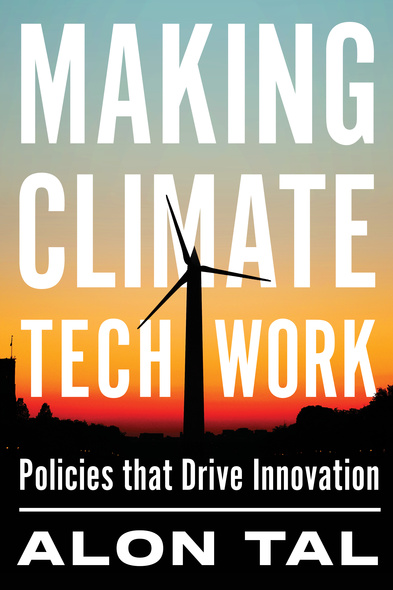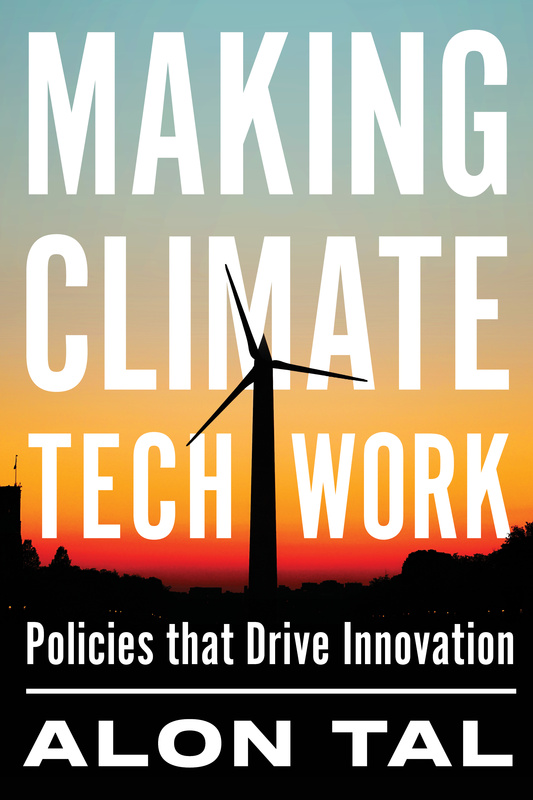Climate tech is critical for averting planetary chaos. Half the greenhouse gas reductions required to reach “net-zero” climate targets in 2050 will need to come from technologies that have not yet been invented. Without effective government interventions, market incentives alone will not produce a rapid transition to a low-carbon economy. The commercial value of innovative climate technology, especially in its early phases, remains underpriced—far below its social value. The good news is that smart policies can change these dynamics and catalyze the necessary creativity and investment in clean technology, and its deployment. The key question is: which approaches can lead us to future carbon neutrality, and which are likely to fall short?
In Making Climate Tech Work, environmental policy expert Alon Tal demystifies climate innovation programs around the world—no policy background needed. Beginning with a review of government’s general role in technology policy development, Tal assesses each policy alternative, describing eye-opening experiments in diverse countries, presenting a range of case studies, interviewing leading decarbonization experts, and interpreting new empirical data. Discover how Germany incentivized renewables; Denmark became a wind energy superpower; Australia phased out incandescent bulbs; California’s prisons pioneered low-carbon menus; and why carbon taxes have failed around the world—but could be designed for success.
Tal distills the benefits and drawbacks of each policy, along with related ethical questions and public perceptions. He concludes by addressing two commonly overlooked issues in climate policy: disruption of workers’ livelihoods from the clean energy transition; and integrating the Global South into the planet’s new low-carbon economy—as the region that has contributed least to climate change but which must be part of a global solution. Tal not only evaluates which policy strategies effectively reduce emissions but also how they can promote climate tech innovation.
Humanity is ultimately in a race against time and effective climate policies are critical to ensure a sustainable future. Making Climate Tech Work serves as an essential primer for policymakers, academics, activists, and anyone interested in climate solutions.
In Making Climate Tech Work, environmental policy expert Alon Tal demystifies climate innovation programs around the world—no policy background needed. Beginning with a review of government’s general role in technology policy development, Tal assesses each policy alternative, describing eye-opening experiments in diverse countries, presenting a range of case studies, interviewing leading decarbonization experts, and interpreting new empirical data. Discover how Germany incentivized renewables; Denmark became a wind energy superpower; Australia phased out incandescent bulbs; California’s prisons pioneered low-carbon menus; and why carbon taxes have failed around the world—but could be designed for success.
Tal distills the benefits and drawbacks of each policy, along with related ethical questions and public perceptions. He concludes by addressing two commonly overlooked issues in climate policy: disruption of workers’ livelihoods from the clean energy transition; and integrating the Global South into the planet’s new low-carbon economy—as the region that has contributed least to climate change but which must be part of a global solution. Tal not only evaluates which policy strategies effectively reduce emissions but also how they can promote climate tech innovation.
Humanity is ultimately in a race against time and effective climate policies are critical to ensure a sustainable future. Making Climate Tech Work serves as an essential primer for policymakers, academics, activists, and anyone interested in climate solutions.
Are you using Making Climate Tech Work in a course? Classroom resources are available through Island Press.
Making Climate Tech Work is exceptional in its comprehensive and even-handed review of policies that may contribute to meaningful reductions in emissions of carbon to the atmosphere. Coverage is more factual than wistful, a refreshing change from some competing books offering solutions. Yet, it is also hopeful, providing thoughtful analysis of options that offer practical potential for responding to the global climate crisis. This book should be particularly valuable to those interested in helping drive societal changes that reduce climate-changing gas emissions.’
If you read one book about climate change this year, make it Alon Tal’s. No one understands better the policies that can lead to a carbon-neutral economy and avert a climate catastrophe.
Alon Tal accomplishes the nearly impossible task of writing a book on climate technology policy that is both substantive and enjoyable to read. It is an excellent resource for anyone who wants to understand how the interplay between climate technology innovation and public policy will determine whether we are able to address the most daunting challenge of our era.
In this impressive global analysis of clean tech successes and failures, Prof. Alon Tal explores the role that government policies and programs have played in stimulating green technological change. This highly readable book will be of great interest to decision makers, practitioners, researchers, and students concerned with making a net-zero world possible.
A richly detailed but accessible introduction to policy approaches to mobilize climate tech.
Alon Tal's career has been a balance between academia, politics, and public interest advocacy. He is presently a visiting professor at the Stanford Graduate School of Business and outgoing chair of the Department of Public Policy at Tel Aviv University. Tal has published hundreds of academic and popular articles and written/edited some eleven books on topics involving sustainability. Between 2021 and 2022 Tal was a member of the Knesset, Israel’s Parliament where he chaired the country’s first subcommittee on Environment and Climate. He also served on Israel’s national delegation to the COP27 climate conference.
Preface
Chapter 1: Tech Policy and the Climate Crisis
Chapter 2: A Global Framework for Mitigation
Chapter 3: Jumpstarting Research and Development
Chapter 4: Monetizing Carbon
Chapter 5: Incentives for Innovation
Chapter 6: Forcing Climate Technology
Chapter 7: The Power of Public Procurement
Chapter 8: Nudging Down Carbon
Chapter 9: Disruption
Chapter 10: Development and Decarbonization
Chapter 11: Reaching Net Zero
Acknowledgments
Notes
About the Author
Index
Chapter 1: Tech Policy and the Climate Crisis
Chapter 2: A Global Framework for Mitigation
Chapter 3: Jumpstarting Research and Development
Chapter 4: Monetizing Carbon
Chapter 5: Incentives for Innovation
Chapter 6: Forcing Climate Technology
Chapter 7: The Power of Public Procurement
Chapter 8: Nudging Down Carbon
Chapter 9: Disruption
Chapter 10: Development and Decarbonization
Chapter 11: Reaching Net Zero
Acknowledgments
Notes
About the Author
Index








